In the labyrinthine bowels of Twickenham Stadium, Canan Moodie was losing his patience. About an hour earlier he had stolen the breath of 82,000 fans by ripping through the New Zealand All Blacks with a dazzling solo run that cruelly ended in a disallowed try. Still, his first outing at outside centre for the Springboks was a hit and naturally every journalist in the post-match mixed-zone wanted a piece of him.
Except he had little left to give. Following on from various TV and radio commitments, he had just concluded a more than 10 minute conversation with one group of writers and was making a beeline for the exit. He was almost there when another cohort called out his name. A nod from the Springboks’ media manager consigned his fate. He scoffed and rolled his eyes, looking like a teenager who had just been told to clean his room.
The sulk didn’t last long. Moodie instantly replaced his scowl with a beaming grin and answered every question that came his way. No doubt he’d heard them all before – How does it feel to be a Springbok? Are you looking forward to the World Cup? What’s your best position? – yet he delivered each reply with sincerity and quotable lines.
“This is the stuff you dream of,” he said. A week earlier, after a player of the match performance against Wales, he used the word “surreal”. He said he could scarcely believe that he was now one of the hottest prospects in the game, that he’d faced the Haka, that he’d scored a brace at the Principality Stadium and would soon be jetting off to France to take part in a World Cup all before turning 21. “Four years ago I’d have laughed if someone told me all of this would happen,” he continued.
On the day Siya Kolisi lifted the Webb Ellis Cup in Yokohama in November 2019, Moodie was nine days past his 17th birthday. He’d just completed his debut season in the first team at Boland Landbou high school. He’d always possessed athletic gifts, and a sudden growth spurt the year before saw him stretch over 30 cm in just a few months. Even so, hardly anyone could have predicted his rapid rise to the national team.
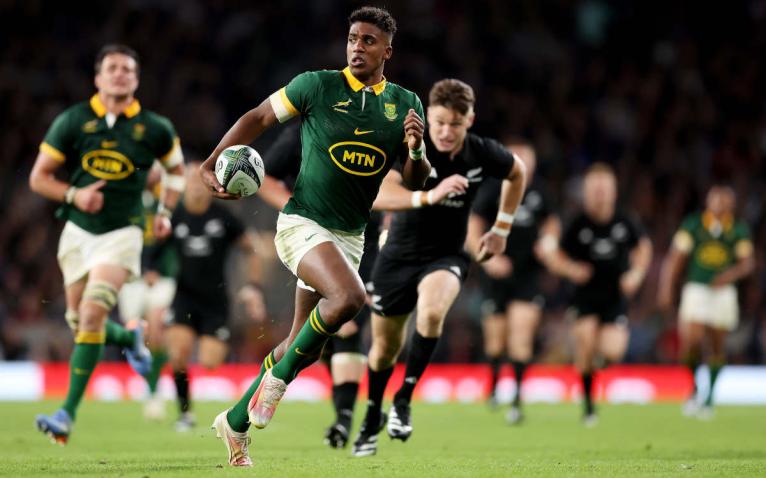
“I gave him the nickname ‘Kameelpad’,” says Schoeman du Preez, Moodie’s under-16 high school coach, using the Afrikaans word for giraffe. “He was tall and skinny and a little clumsy. He’d get his feet in tangles. But he was incredibly hard working. He was extremely coachable. You’d show him something and he’d work on it until he got it right. And he was quick. He was always quick.
“But there was something else. Whenever he kept his composure and took a bit of time, he had some great touches with ball in hand. He was a full-back or wing and was often rushed in what he was doing. But I thought if we could get him closer to the play he could be something special.”
Moodie was shifted to fly-half and then to inside centre. But both positions stifled his free-wheeling play. So, after an entire reorganisation of the backline, Moodie found himself at outside centre.
We’d practice this off-load in the tackle that we called the ‘Sonny Bill’. We’d get the guys passing the ball on with one hand after taking a hit. It’s not an easy thing to do. Canan was so good at it.
Schoeman du Preez, Canan Moodie’s U16 coach
“It was obvious that’s where he belonged,” says Olaf Bergh, one of Moodie’s school coaches. “He would have played anywhere, and he clearly has that same attitude at the Boks. Every player has a favourite position. Canan’s without doubt is 13.”
As if to prove the point, Moodie’s Instagram account is @moodie_13. He himself has said he “fell in love” with the position, one where his natural gifts could be better expressed in both structured and broken play.
“We’d practice this off-load in the tackle that we called the ‘Sonny Bill’,” du Preez reveals. “We’d get the guys passing the ball on with one hand after taking a hit. It’s not an easy thing to do. Canan was so good at it. We saw that against the All Blacks when he intercepted and passed in a flash. When I saw that I thought, ‘Wow, I’ve seen that before’. The only thing that’s surprising is how quickly it’s happened. The fact that he’s got to the top isn’t a surprise to anyone.”
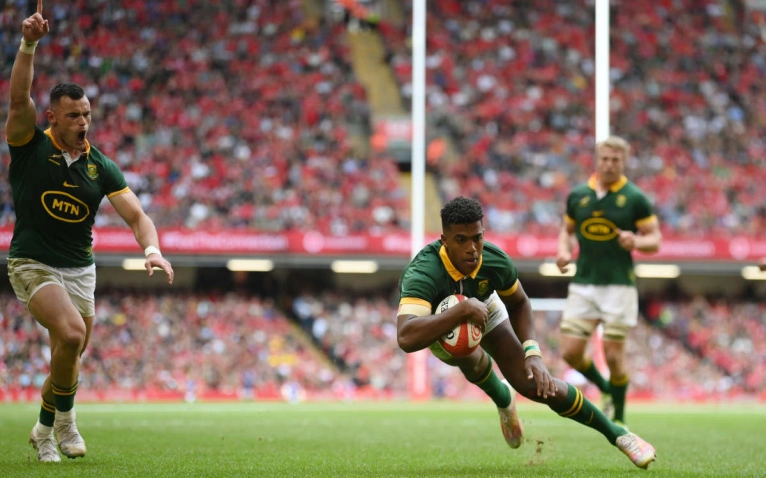
Not least of all to his brother, Keanu, eight years his senior and one of the most influential figures in his life. A gifted athlete himself, Keanu showed some promise on a rugby field until a collision in the air under a high ball ended with a broken collar bone. After that, his mother, Chantel, banned him from playing the sport again.
“Parents are stricter with their oldest children,” the elder Moodie boy says. “They were more forgiving with Canan. But he was clearly a talent. He was just a bit lazy when he was younger. He didn’t always show the passion. I used to get quite frustrated with him.”
Keanu’s athletic career steered him towards long jump and hurdles. He says he felt compelled to serve as a guiding light to his younger brother, insisting he participate in 5am training sessions and after school gym work.
I’m not going to lie. Canan and I were robbed four times when we’d walk to training. We’d get held up and have to hand over our spikes or whatever money we had on us. But it wasn’t like we went to bed with gunshots outside.
Keanu Moodie, Canan’s older brother
The Moodie’s grew up in Paarl, the small town about a 50 min drive inland from Cape Town. It’s a place that punches above its weight in South Africa. Jean de Villiers, Kurt-Lee Arendse, Chester Williams and the Olympic swimming champion Ryk Neethling all hail from these parts.
However, like almost everywhere in South Africa, violence was never far away. Two doors down from the Moodie home was a “drug den”, as Keanu describes it, but he stresses that his family never feared for their life.
“Those things can be overblown,” he says, referencing a pair of articles in the Daily Mail and Guardian newspapers that, in his mind, painted a distorted view of his childhood. “Look, I’m not going to lie. Canan and I were robbed four times when we’d walk to training. We’d get held up and have to hand over our spikes or whatever money we had on us. But it wasn’t like we went to bed with gunshots outside or that we were scared for our life.
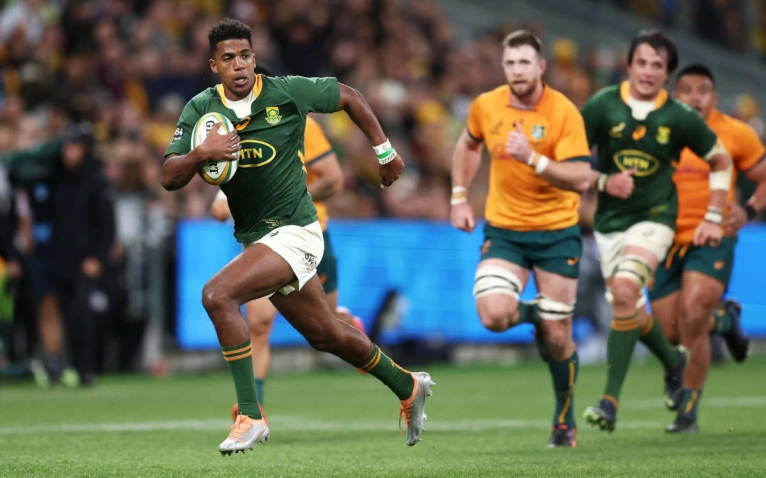
“Because I was an athlete, I was well known. All the times I was robbed I was in areas that didn’t know me. We were on the outskirts of the really serious stuff. We knew people who were involved in crime or who were victims of crime but it didn’t come to our door. Life was good. We didn’t have much. Like, we didn’t have a car to drive to training and my parents weren’t rich. But we never had a victim mentality. That’s the one thing our parents made sure we never had.”
The younger Moodie also had Grant Williams to show him the way. The 27-year-old Springboks scrum-half with enough pace to play on the wing is a close family friend. “He set an example,” Keanu says. “Both in terms of how he would train and focus and stay out of trouble. But also in the way he carried himself in the community.
“We’re proud in Paarl. People who make it out of here and become something have a responsibility. Other people respect that. So I always tried to tell Canan that if he was going to do this then he had to do it properly.”
We trained from before the sun rose until long after dark. . We found this tyre and hung it up with poles and ropes. On a slow day Canan would pass a ball through that tyre a thousand times.
Keanu Moodie
The message was well received. By the time he made his school’s first team, Moodie had already earned a reputation as a zealous worker. After second helpings in the hostel, he would be back out on the training pitch. Not that his studies slipped. Impressive grades in maths and science meant a career as an architect remained a realistic ambition.
Even in his final year in school, when the covid lockdown reduced his season to just a single game, Moodie continued to work. “We trained from before the sun rose until long after dark,” Keanu remembers. “Lifting weights, running sprints, core work. We found this tyre and hung it up with poles and ropes. On a slow day Canan would pass a ball through that tyre a thousand times. I’m serious. Something clicked inside him.”
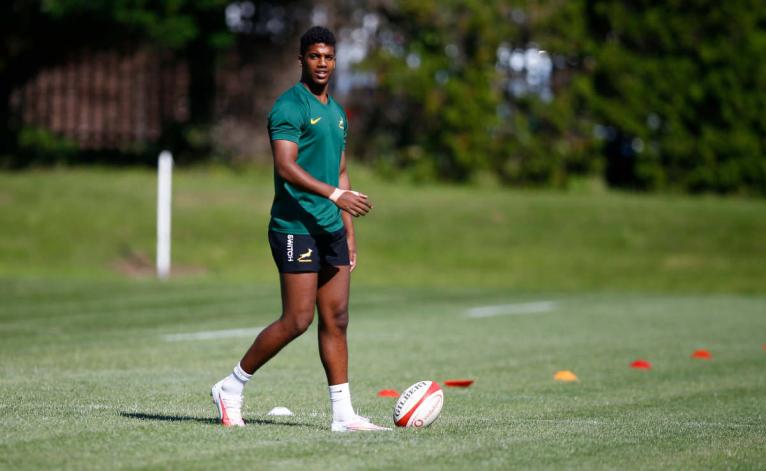
“I’d like to think that he had the perfect environment to develop,” Bergh adds. “We’re not the biggest school. We have around 380 boys but 350 play rugby. There are other schools in the Cape that are much bigger, and have more Springboks. Canan is our fifth [Attie Strauss, Hottie Louw, Deon Carstens and Derick Hougaard came before] and we’re incredibly proud of our history. He was shy and boys like that can disappear in larger schools. He was given the space to become his own person. We couldn’t be prouder of him.”
Boland Landbou’s feeder primary school now hosts the Canan Moodie Primary School Rugby Festival with more than 50 schools taking part. Last year, after scoring a try on debut for the Springboks against Australia, Moodie attended the event and was given a royal reception.
“He stood for three hours signing balls, shirts, even the kids’ school uniforms,” du Preez remembers. “He didn’t complain once. He would have stood for another three hours. I bought him a burger for lunch but it was stone cold by the time he touched it. We had to eat it in private in the change room just so he could get a moment to himself.”
He deserves everything that he is currently achieving in terms of being selected and in terms of his delivery of what he’s doing. “The guy is just unbelievably professional.
Felix Jones, Springboks attack coach
Stories like this are common. There’s the one where he ran as a touch judge for the Blue Bulls women’s side, the Daisies. There’s another where he regularly returns to his school and shares meals with the students. Despite being fast tracked by Jake White at the Bulls, and despite achieving so much at such a young age, he remains tethered to the communities that made him.
“He told me the other day that he wants to play 100 Tests for his country and I have no doubt he will” du Preez says, reiterating White’s belief in the young star. “He’s got everything. He’s got talent, he works hard, he’s humble, and he’s a good person. That last part is maybe the most important.”
The plaudits have kept coming. “He deserves everything that he is currently achieving in terms of being selected and in terms of his delivery of what he’s doing,” gushed the Boks’ assistant coach, Felix Jones. “The guy is just unbelievably professional. He takes care of himself. He keeps his feet on the ground. He does his work and he connects with the guys around them.”
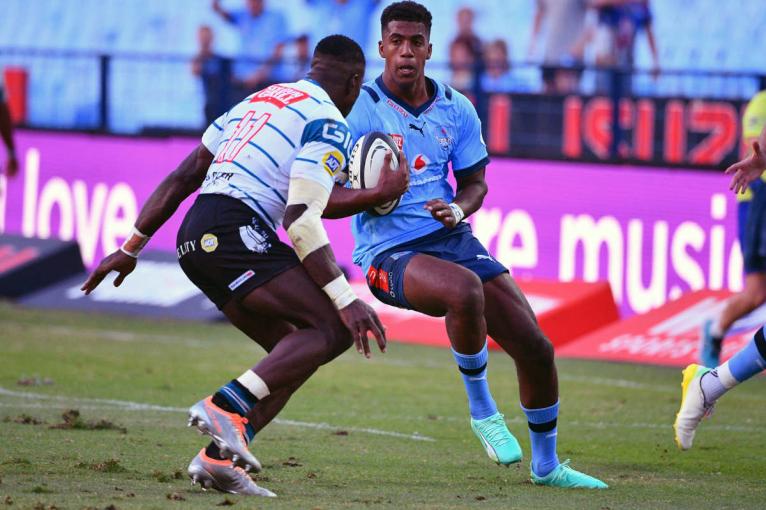
With so much hype and affection, how on earth does he stay grounded? Cast your mind back to when you were 20-years-old. If you had the world at your lighting quick feet, how would you have reacted? Does he ever allow himself to dream impossible dreams?
“Whenever I do I think of my mom and dad and what they’d say to me,” he explained after that blockbuster show in Twickenham. “I remember my family. I remember my team-mates and the sacrifices they’ve made. I think of my school and all the people that helped me get here. I can’t get ahead of myself. I really feel that this is just the start.”


Like I said all along. 13 is his game and he has all the attributes of a great in the making. Keep that 14 open for KLA. The try scoring machine.
It would be incredible if we see Canan starting in the knockouts at 13. Alongside Esterhuisen (based on form).
He is incredibly mature for a young man. Incredible talent.
From a kiwi, has a huge future. Good to read about the hard work he has put in to develop his natural talent and the family, school and community that keeps him grounded and supported.
Spoken like a true rugby man. I watch a lot of schoolboy rugby - in South Africa we have a 24-7 TV channel dedicated to school games - I noticed him when he was playing for Boland Agricultural High School at No13 and he was sensational. I would love to watch more schools rugby from New Zealand - I only see it occasionally when the international schoolboy competitions take place.
A legend in the making